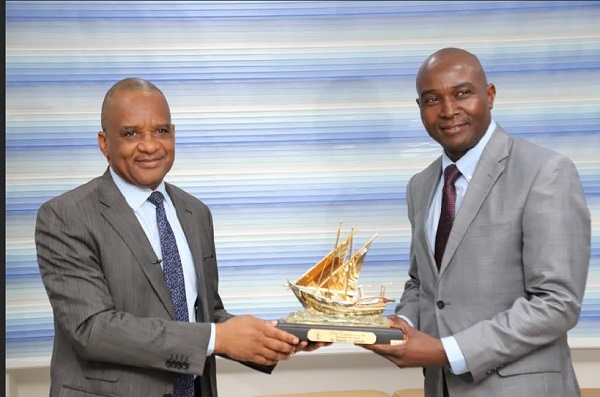
The Management of the Nigerian Maritime Administration and Safety Agency (NIMASA) said it has entered into a partnership with the Nigeria Liquefied Natural Gas (NLNG) to set up a working committee to ensure improved liaison between both organisations in the maritime sector and the interest of the nation.
The assistant director, public relations, NIMASA, Osagie Edward disclosed in a statement that the agreement was reached during a courtesy visit by the management of the NLNG to NIMASA, led by its managing director, Dr Philip Mshelbila.
The director-general of NIMASA, Dr. Bashir Jamoh noted that a better working relationship between both organisations would greatly enhance operations in the nation’s maritime sector. He assured the NLNG management that NIMASA would extend the already existing working relationship the agency has with the NLNG Ship Management Limited (NSML) to the parent body and urged the NLNG to consider the Nigerian flag as the first option for her vessels.
“This is a new beginning, our focus should be what is best for Nigeria and not just for the NLNG or NIMASA,” Jamoh said.
While commending the NLNG for providing platforms for sea time to train Nigerian seafarers, the NIMASA DG noted that the agency is committed to attaining best global practices, so that certificates issued by Nigeria will be recognised globally.
“We are working to ensure that the certificates of competency issued by the Nigerian Maritime Administration are of international standard. This will make it easy for the NLNG and other international organisations to accept them.”
Jamoh said that the agency needs the NLNG to boost the nation’s tonnage. “NIMASA needs the NLNG, we desire to have vessels of the NLNG fly the Nigerian flag. Just imagine that vessels of the NLNG are on the Nigerian Registry. Our tonnage will increase exponentially, the Nigerian flag will earn much more respect globally and we will get better recognition,”
Mshelbila noted that the management of the NLNG is committed to the deliberate indigenisation of the human component of its operation, adding that they are ready to partner with NIMASA to enhance the safety and security of lives and assets in the Nigerian maritime domain. He noted that they are on the same page with NIMASA in terms of capacity development and the quest to ensure Nigeria attains internationally acceptable standards in her operations in the maritime sector.
“We at NLNG have realised that for us to fulfil one of our key visual elements – helping to build a better Nigeria – we need to work with all our stakeholders, including NIMASA. We are aware that NIMASA and our subsidiary, NMSL, are working hand-in-hand for the progress of this country and we desire the same spirit of partnership and collaboration [to] be extended to the NLNG.
“I believe that for NLNG to fulfil its mission as a business, it needs to partner with NIMASA. NIMASA is an important stakeholder for us. We do not just see it as a regulator only. I know we have various training programs, working closely with NIMASA, being explored by NMSL to provide sea time training for seafarers, which has enabled seafarers to earn more qualifications and get certifications.”
He appreciated the NIMASA for the active management of the activities in the Gulf of Guinea. “We can certainly testify from the report that we get, both locally and from international bodies, that there has been a huge success in the war against criminal activities in the Gulf of Guinea and we know that the Deep Blue Project is instrumental to attaining this success.
“Based on the information at our disposal, I don’t think there has been any case of abduction since this year and that’s a testament to the success of the Deep Blue Project initiative that NIMASA has driven, in collaboration with the Nigerian Navy, as well as regional and non-regional bodies.”
NIMASA and the NLNG have agreed to, as a matter of urgency, look into port charges and how best to make Nigerian ports competitive, effectively implement the Cabotage Law/Stevedoring charges/CoC recognition, registration of NLNG vessels on the Nigerian Ship Registry amongst others.
The Nigeria LNG Limited is jointly owned by the Federal Government (49 per cent), Shell Gas B.V (25.6 per cent), Total LNG Nigeria Limited (15 per cent) and Eni International (10.4 per cent), culminating in 51 per cent ownership by the NLNG.

